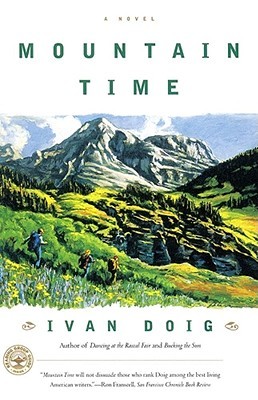In a regional literary world ripe with poseurs, Ivan Doig may be the true descendant of Wallace Stegner. Unlike the typical carpetbagger who begins with preconceived notions as to the nature of the “real” West, Doig actually grew up here during an unforgiving time when the place was good for nothing except for what could be physically extracted from it. The two authors have led somewhat parallel lives, their work growing out of their Western roots, each accepting a necessary flight from beloved surroundings to an academic life lived in cities west of the West.
In Doig’s new novel, Mountain Time, Mitch Rozier—at 50—is at loose ends. His career as an environmental journalist in politically correct Seattle (“Cyberia”) is in a nosedive because of the financial restructuring of his paper, Cascopia. His ex-wife hates him, and his two now-grown children ignore him as he did them while they were growing up; his aged father is tormenting Mitch long distance with tangled business affairs that directly affect him. Mitch’s girlfriend, a caterer and native Moutanan like himself, is the glue that holds his life together.
Mr. Doig—author of the National Book Award nominee This House of Sky—is on familiar ground. In novels such as English Creek, Ride With Me, Mariah Montana, and Dancing at the Rascal Fair, he has created a Montana Yoknapatawpha, complete with multigenerational interrelated families and mutually remembered local history. A native, Doig knows the terrain of working-class Montana: the ranchers, farmers, and small-town businessmen who struggle to adapt to life in a changing West.
Mitch returns to Twin Sulphur Springs, “a country of great mountains and mediocre human chances,” ostensibly to deal with his father’s financial difficulties. There, Lyle Rozier nonchalantly tells him of the leukemia that is slowly killing him: “The doe says ifs about got me. Why I called you.” Lyle—World War II veteran of the South Pacific —is a member of that great generation of Americans who expected nothing from life except the fruits of hard work, pain, and ultimately death, a generation—unlike their progeny—for whom whining and complaining were anathema. While sticking around to care for his ailing father (and forced to tolerate the annoying Donald Brainerd, a new New West hightech neighbor constantly complaining that Lyle’s yardful of rusting farm machinery and “tractor carcasses” is spoiling his bay-window view of the Rockies), Mitch is reminded—through flashbacks to his childhood growing up in “the Springs”—what kind of man Lyle really is: a taciturn survivor of a life typically fraught with contradictions and emotion al turmoil, including die guilt left over from his estranged wife’s death in a car wreck years before.
Complicating all this are the McCaskill sisters, Mariah and Lexa. Mariah, the elder, is a successful globe-trotting photojournalist. She is middle-aged, divorced, but still retains a wild, red-haired beauty that can “cloud men’s minds.” Mariah talks the reluctant Mitch into permitting her to photograph the willing Lyle’s last days for a newspaper photo series. Lexa McCaskill, Mitch’s live-in companion, patiently awaits the passing of his mid-life difficulties so that they can get on with their lives.
The central theme of Mountain Time is the baby boomer generation’s reaction to two inescapable f;icts: the passing of their parents, the realistic and hardworking World War II generation, and their relations with their own children, the alienated products of divorce, mindlessly groping their way through a seemingly nihilistic turn-of-the-millennium hightech consumer society. Mitch spends a lot of time contemplating his dying father and his own out-of-reach kids, for which the idealism he acquired during his coming-of-age in the 1960’s doesn’t seem to be of much help.
Sigmund Freud wrote that the most poignant day in a man’s life is the day of the death of his father. When Lyle finally passes on in his sleep, Mitch sees the event as anti-climactic and is merely numbed. He, Lexa, and Mariah set out on a backpacking trip into die stunning Rocky Mountain Front backcountry of the Bob Marshall Wilderness, with the idea of honoring Lyle’s wish to have his ashes scattered—and the ritual photographed by the journalistic voyeur Mariah —atop the (fictional) Phantom Woman Peak. In 1939, the 18-year-old Lyle had helped build the Phantom Woman fire tower while employed by the Depression-era Civilian Conservation Corps, in the course of which he met—unbeknownst to him—the renowned conservationist Bob Marshall (about whose legendary tramps in the Northern Rockies Mitch is researching a piece). On that summer day in 1939, Bob Marshall almost broke a leg on an unnailed step on the tower; in 1996, Mitch Rozier docs so after a row with Lexa and the professionally minded Mariah over changing his mind about the ash-scattering ceremony, because “Mv father never cared a whoop about any of this [the Bob Marshall Wilderness] . . . he wanted it carved up into money. Just never quite managed to figure out how.” Mitch’s broken leg forces Lexa to hike out for help, leaving Mitch and Mariah to a contrived love affair in the fire tower cabin: a forced and predictable device designed to make for a happy ending when Mitch and Lexa reunite in Seattle at the novel’s conclusion. Ivan Doig should know better.
He does know his Rocky Mountains, and he paints his landscapes well. He knows his ranchers and Hutterites too, and has a sharp ear for the nuances of colloquial Montana speech. But as the critic poet Randall Jarrell once observed, “A novel is a long narrative with something wrong with it.” Mountain Time is at once a beautiful and a flawed thing.
[Mountain Time, by Ivan Doig (New York: Scribner) 316 pp., $25.00]

Leave a Reply